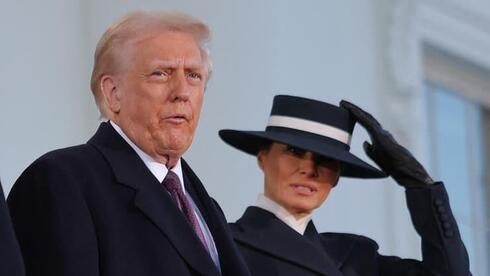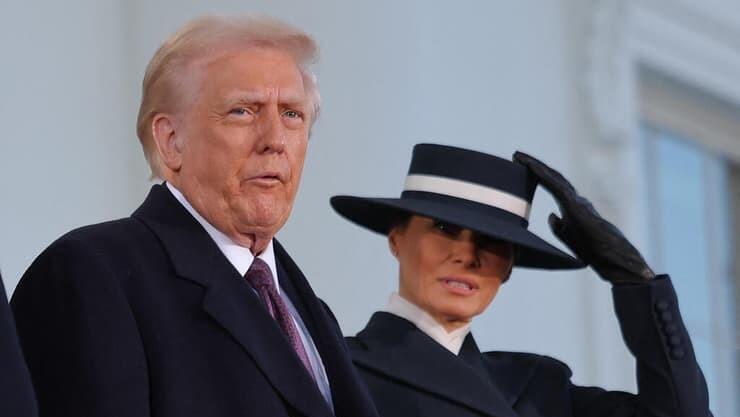
"Idi Amin level corruption": Trump’s $TRUMP coin profits raise major ethical red flags
As the coin surges in value, questions emerge about Trump’s pre-inauguration crypto ventures and potential conflicts of interest.
True to his provocative style, Donald Trump used the days leading up to his inauguration for opportunistic ventures and personal wealth-building. Just days before the ceremony, he and his wife Melania launched cryptocurrencies bearing their names. In a move deemed particularly cynical even by the crypto industry, the Trump family amassed an extensive collection of coins with questionable utility, whose liquid market value currently stands at around $7.5 billion.
According to the project’s website, the initiative includes one billion coins, with 200 million released for trading last Friday. The remaining coins will be released in three waves during Trump’s term. The website notes: “Trump Memes are intended to function as an expression of support for, and engagement with, the ideals and beliefs embodied by the symbol "$TRUMP" and the associated artwork, and are not intended to be, or to be the subject of, an investment opportunity, investment contract, or security of any type.”
The first to launch a coin was Trump himself. On Friday, he sold 200 million units of the meme currency called $TRUMP, announcing the move on his social network, Truth Social. Within hours, the coin’s value surged 600%, peaking at $72 per unit—making it one of the most expensive meme coins on the market. Eric Trump, who runs the family’s crypto business, described the coin as "the biggest digital hit in the world." The coin is now expected to be monitored by the US Securities and Exchange Commission (SEC), headed by a Trump appointee.
Meme coins, sometimes referred to as “shitcoins,” are cryptocurrencies inspired by memes or ideas and often lack practical utility. Their prices are typically measured in fractions of a cent and are characterized by extreme volatility. A notable example is Dogecoin, created in 2013 as a joke about the crypto market. Its founders, two software engineers, based it on a meme featuring a Shiba Inu dog. Elon Musk, a major Trump donor, has been promoting Dogecoin for years. Notably, Musk and Trump also named the Department of Government Efficiency they established “DOGE.”
Family-controlled companies
Eighty percent of Trump’s coins that have been minted but not yet traded are held by two companies: CIC Digital LLC and Fight Fight Fight LLC, which was incorporated in Delaware on January 7. These companies, controlled by the Trump family, charge sales commissions and are expected to generate undisclosed revenue. This unusual concentration of holdings indicates the family’s intent for significant personal profit. Critics have noted that the decision to retain such a large stake has made Trump a crypto billionaire, placing him among the 25 wealthiest people in the United States.
This is not Trump’s first venture to generate profits since his victory. In recent months, he launched a series of products, including "Trump watches" priced up to $100,000, $100 silver coins, 1,000 pairs of limited-edition sneakers, and branded Bibles costing $60 each.
The cryptocurrency’s official website invites users to “Join the Trump community. This is history in the making.” It features an illustration of a young, thin Trump without a tie, waving, alongside the quote: “Celebrate our win and have fun,” accompanied by his signature. Users can purchase the coins using a debit card or cryptocurrency. “This Trump Meme celebrates a leader who doesn’t back down, no matter the odds,” the website says.
Recently, Melania Trump also launched her own cryptocurrency, called MELANIA, which saw partial success. Its value quickly soared to a market capitalization of $8.5 billion but simultaneously caused a 40% drop in the price of $TRUMP. However, by the end of the day, $TRUMP recovered to around $60 per unit.
Trump’s History with Crypto
Trump has demonstrated a growing interest in cryptocurrency over the years. During his 2020 campaign, he launched a series of NFTs to raise funds, which sold out quickly—a tactic he also employed in the most recent election. In August, Trump announced his involvement in a crypto project called World Liberty Financial, which includes real estate tycoon Steve Witkoff, who played a key role in brokering a ceasefire between Israel and Hamas. The project features a digital currency trading platform and plans to launch its own token, $WLFI. Although Trump and his family do not own the project outright, Trump and his sons—Eric, Donald Jr., and Barron—are listed as officials on the project’s website. Last summer, Trump declared that “the United States will be the crypto capital of the world.”
Bitcoin Surge
Trump’s victory also sent Bitcoin to record highs, surpassing $100,000 within a month of election day. Analysts attribute this surge to his announcements of key appointments: Howard Lutnick as Commerce Secretary and Paul Atkins as SEC Chairman. Additionally, Trump pledged to sign an executive order on his first day in office to ease regulatory burdens on the crypto market.
Ethical and Legal Concerns
There is no precedent in American politics for a president-elect to act so brazenly to enrich himself before taking office. While selling products like watches and sneakers is unusual, it pales in comparison to the ethical issues raised by selling meme coins. Critics argue that these coins, with no real value, represent a direct transfer of wealth from the public to Trump’s private pockets.
Even within the crypto industry, where a president-elect’s involvement is often welcomed, Trump’s actions have drawn sharp criticism. Businessman Anthony Scaramucci, Trump’s former communications director turned critic, commented: “The Trump meme coin stuff is bad for the industry. Don’t delude yourself. It’s Idi Amin level corruption.”















